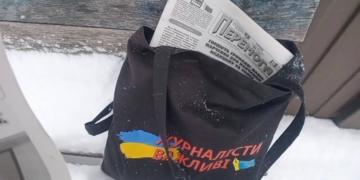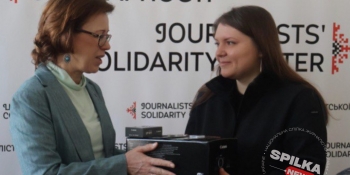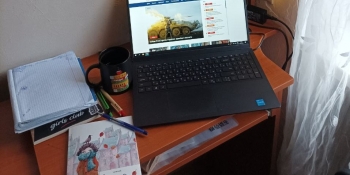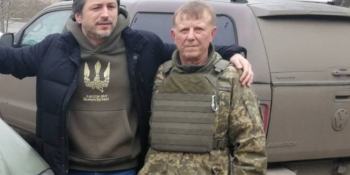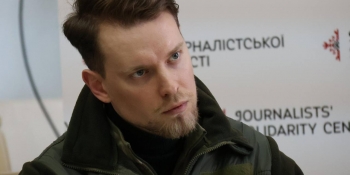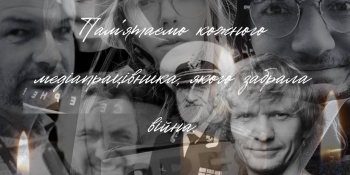Information warfare is a significant integral part of Russia’s aggression against Ukraine. This was discussed during a British-Ukrainian webinar dedicated to the anniversary of the Russian full-scale invasion on Wednesday, March 1.
The moderator was John Whittingdale, a member of the British Parliament since 1992 / Secretary of State for Culture, Media, and Sport (2015-2016) / head of the “friendship group” with Ukraine in the Parliament of Great Britain.
“I recently returned from the OSCE Parliamentary Assembly, which was held in Vienna and where the Russian Federation’s crimes in Ukraine were discussed,” said Mr. Whittingdale. “One of the issues discussed concerned journalists. I know about the terrible events that have already taken place, the deaths of dozens of journalists. We are closely following these serious aspects of the war in Ukraine.”
John Whittingdale noted that Great Britain is doing everything possible for Ukraine, including in matters of investigation of war crimes committed by the Russian military in Ukraine. He supported the idea of creating a special tribunal to punish war criminals.
“The main goal of our meeting is the fight against impunity,” noted one of the webinar speakers, Sergiy Tomilenko, the President of the National Union of Journalists of Ukraine (NUJU). “Today, the main source of violations of journalists’ rights and attacks on freedom of speech in Ukraine is Russia, which unleashed this bloody war in the center of Europe. Calling for justice, we support the initiative to create a tribunal against Putin. And we especially emphasize the need to introduce a special tribunal against Russia for inciting war propaganda and war crimes against journalists and mass media.
According to Sergiy Tomilenko, the Russian military hardly hide the fact that they consider Ukrainian journalists to be the target of their shelling and attacks. Since the beginning of the war, the occupiers have killed at least 50 media workers, but the fate of several more remains unknown. However, the consequences of Russian aggression on Ukrainian journalism are not limited to this. Media workers are among the Ukrainians who were forced to become migrants and lost their housing, and the opportunity to earn a living in their favorite profession. Ukrainian journalists experience enormous psychological stress.
“We were not ready for all this. But thanks to the courage and resilience of media workers from Ukraine and other countries thanks to the solidarity of our foreign colleagues, the International and European Federations of Journalists, UNESCO, the Justice for Journalists Foundation, and a number of international organizations, we were able to partially withstand the first wave of wartime challenges,” said Sergiy Tomilenko.
Through the network of the Journalists’ Solidarity Centers, the NUJU helped 2,000 media workers who were in trouble. And for those colleagues who are going to work at the front and in the de-occupied territories, NUJU has organized points for free rental of protective equipment: bulletproof vests, helmets, and tactical first-aid kits.
“Today, it is difficult for all of us to imagine a world without digital gadgets. But the digital world ends where mobile towers and power grids are destroyed by artillery and rockets of the occupiers,” emphasized Sergiy Tomilenko. “In the de-occupied territories, they say that during the Russian occupation, the main source of relatively true information for people was meetings at local markets. Those who had battery-powered radios told others what they had heard from Kyiv. Instead, Russian propaganda created a completely distorted information realm for the people staying in the occupied territories, saying that Kyiv and other major cities were occupied by Russians, that Ukraine had fallen, and that the West was already begging the Kremlin for mercy.”
That is why the NUJU made every effort to return Ukrainian mass media to the de-occupied territories. Where there is no television or internet, the real source of information can only be a newspaper. So far, a total of 20 local newspapers have been revived in the de-occupied and front-line territories with the help of the Union.
Sergiy Tomilenko emphasized the importance of preserving Ukrainian media because they provide millions of Ukrainians with access to the truthful and latest information. On the other hand, since the beginning of the war, a third of the Ukrainian mass media have stopped their work. Therefore, the NUJU calls on Ukrainian government officials in partnership with the governments of other countries to establish a Fund for the Development of Ukrainian Media, which would be filled with funds from various sources and would serve as a source of sustainable systemic support for the media in this difficult time.
Yevheniya Virlych, the editor-in-chief of the online publication called Kavun.City from Kherson shared her impressions of 4.5 months of work in the occupation.
“Today is the anniversary of the complete occupation of our city by the Russians,” she said. “We remember those of our compatriots who, without having any weapons, tried to stop the Russian tanks… From the first days, the occupiers started persecuting all the pro-Ukrainian residents of the city. They had lists of journalists, public figures, and activists at their disposal. Their homes were visited, people were kidnapped, and many of these abductees still remain in captivity.”
Yevheniya Virlych said that while working in occupied Kherson, she had to hide in the apartments of friends who had left the city earlier. The NUJU and international financial donors provided substantial assistance in her work. Finally, Yevheniya had to leave. And when she visited her home after the liberation of Kherson, the neighbors said that the occupiers came to her house several times, looking for the journalist. Yevheniya added that she was luckier than many other colleagues from Kherson, such as Anzhela Slobodian and Zhanna Kyseliova, who spent many days in Russia’s captivity.
Secretary General of the European Federation of Journalists Ricardo Gutierrez reminded that the first Ukrainian journalist Yevhen Sakun since the beginning of the mass aggression was killed during a missile attack on the Kyiv TV tower exactly one year ago, on March 1, 2022. Since then, many more journalists have become victims of the occupiers, while the invaders purposefully opened fire on cars with ‘PRESS’ markings. Russia’s liquidation of journalists went so far that on May 30 they killed the French journalist Frederic Leclerc-Imhoff, who was filming the evacuation of the civilian population in the Luhansk Region.
“According to international law, a journalist must be protected as a civilian, even if he works with the military,” Ricardo Gutierrez emphasized. “War crimes against civilians must be investigated and deserve the highest possible punishment. Journalists document these crimes, so their safety is especially important.”
Ricardo Gutierrez added that the NUJU and the International and European Federation of Journalists have collected dozens of stories of journalists who were beaten, tortured, and killed by the Russians. These crimes should be examined by an international special tribunal, whose activity should complement the investigation of the International Criminal Court of the United Nations. The competence of the special tribunal should include the crimes of the regimes of Putin and Lukashenko. The creation of such a special tribunal was supported by the European Parliament, the Council of Europe, NATO, and many state institutions in Europe and Great Britain. Ricardo Gutierrez emphasized that the issue of the special tribunal will also be considered at the annual conference of the EFJ in May.
The secretary general of the EFJ added that a year ago when the mass aggression of the Russians began, European colleagues considered ways to evacuate journalists from Ukraine. But Ukrainian media workers said that they want to stay and fulfill their professional duties at home. Then the EFJ directed its efforts to support the establishment of the NUJU’s Journalists’ Solidarity Centers in Ukraine.
Viktoriya Vdovychenko, a political advisor and associate professor at Borys Hrinchenko Kyiv University and a member of the Scholar at Risk program at Aston University, drew attention to three key points.
Firstly, it is documenting the crimes of the occupiers in Ukraine, which are of a mass nature and must be punished.
“People need to know that these things are happening in Europe in the 21st century, while in our time this should not happen on any continent of the planet,” emphasized Viktoriya Vdovychenko.
Secondly, it is the confrontation with disinformation, which is especially important on the eve of the elections to the European Parliament.
“Disinformation, like missiles, kills Ukrainians every day. Russia has seen that we are united and is making a lot of efforts to destroy our unity,” said Viktoriya Vdovychenko.
Thirdly, there can be no impunity for crimes. Although the crimes are massive, “people should not be accepted as mere numbers,” it is important to preserve everyone’s memory, show everyone’s face, and restore everyone’s justice and dignity, even after death.
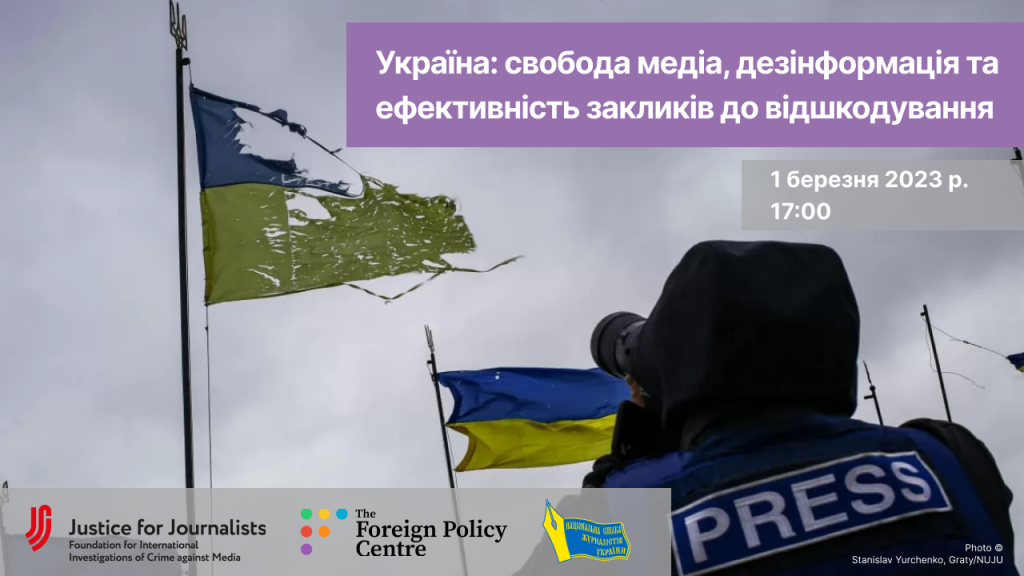
The Ukrainian-British webinar “Ukraine: media freedom, disinformation and the effectiveness of calls for compensation” was organized by the London-based Justice for Journalists Foundation, the British think tank Foreign Policy Center, and the NUJU.
NUJU Information Service





